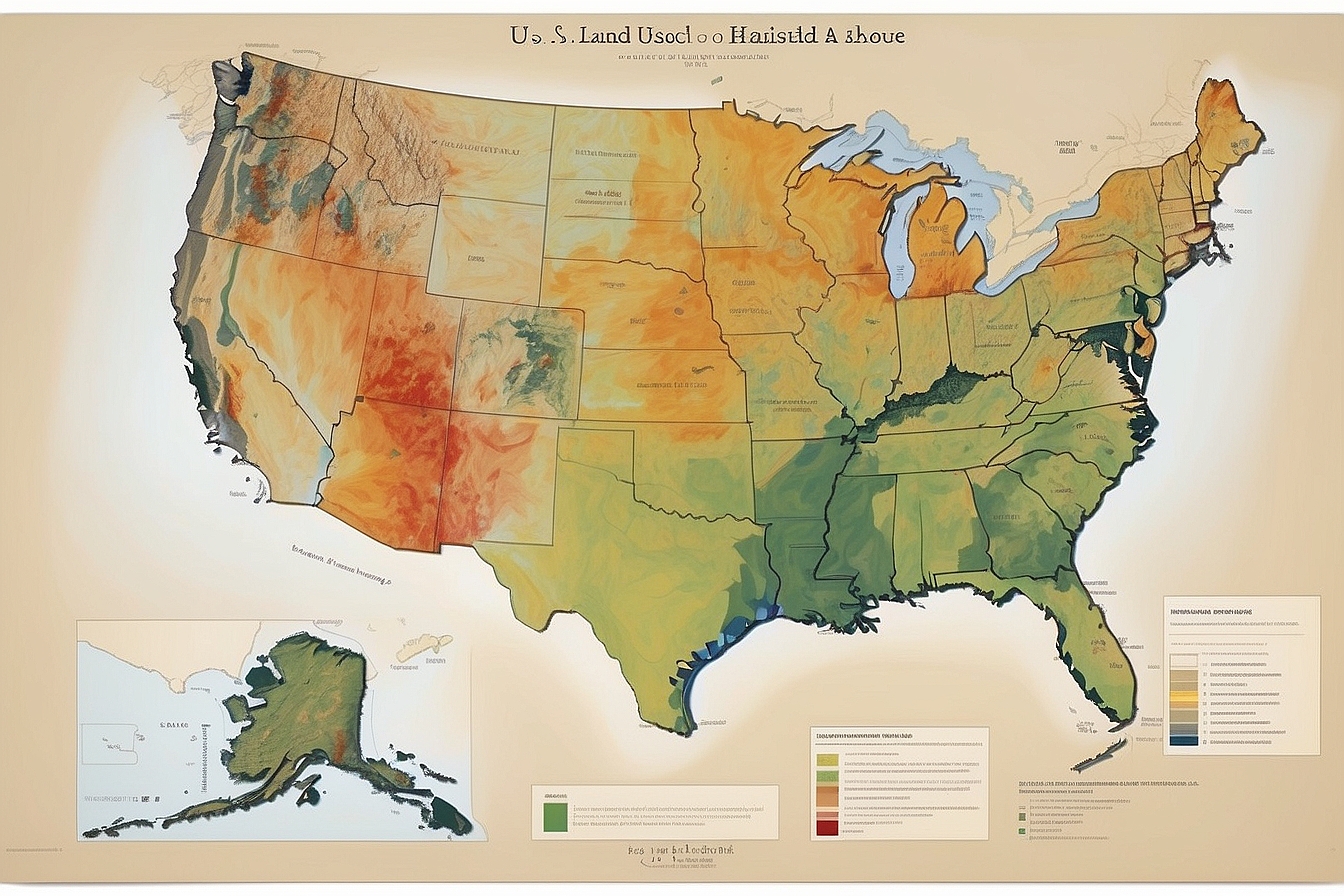We all know that twinge of concern, the quiet murmur in our thoughts about how we can continue to nourish an ever-expanding global population in a sustainable way. It’s a shared sentiment; rest assured, you’re in good company.
Like many others, we’ve been poring over research and it’s quite startling to discover that nearly one-third of food produced is woefully wasted. Our blog intends to offer solace and practical solutions, illuminating paths towards cultivating crops with care and consideration for our precious planet.
So come along—there’s genuine hope on the horizon!
Key Takeaways
- Sustainable agriculture is crucial for balancing food security and environmental protection, using methods like crop rotation, agroecology, organic farming, and precision agriculture to maintain soil health and reduce reliance on harmful chemicals.
- It ties directly into several UN SDGs by promoting responsible land use, encouraging biodiversity conservation, ensuring social inclusion in rural areas, and advocating for climate-resilient farming practices that help fight poverty and hunger.
- Unsustainable agricultural practices threaten our planet through natural resource depletion, loss of biodiversity, water pollution from fertilisers and pesticides, contribution to greenhouse gas emissions which lead to climate change effects such as droughts and floods.
- By focusing on reducing food waste at all stages of the supply chain from field to consumer education regarding food storage can significantly conserve resources. Additionally, investing in innovative technologies helps increase production without expanding agricultural land.
- Protecting natural ecosystems is essential in sustainable agriculture; this involves implementing soil conservation techniques such as regenerative farming methods which contribute both to a healthier environment and boosted crop yields with less impact on the earth.
The Importance of Sustainable Agriculture
Feeding the world responsibly is crucial, and sustainable agriculture plays a vital role in achieving this. It intersects with the UN SDGs, addresses threats of unsustainable agriculture to our planet, and offers benefits for both people and the environment.
Feeding the world responsibly
We stand at the forefront of a major challenge: ensuring global food security while preserving our planet’s health. Sustainable agriculture is the key, balancing our immediate food needs with long-term environmental stewardship.
We embrace farming practices like crop rotation and agroecology to maintain soil fertility and reduce dependency on chemical fertilisers and pesticides. Precision agriculture tools help us optimise resource use, making sure every drop of water and grain of fertiliser counts.
Our commitment extends to supporting farmers in economic profitability while they nurture biodiversity. Organic farming methods are gaining traction, providing people with healthy food choices that also protect wildlife habitats.
By promoting responsible land management strategies, we boost crop yields without sacrificing precious natural resources for future generations. Economic development goes hand-in-hand with hunger eradication as we advocate for fair trade pricing and sustainable business models within the agribusiness sector.
Together, we’re paving the way toward sustainable solutions that feed our world responsibly without compromising the Earth’s delicate balance.
The intersection of sustainable agriculture and the UN SDGs
Sustainable agriculture intersects with the UN Sustainable Development Goals (SDGs) by addressing global challenges such as hunger, poverty, and environmental sustainability. By promoting responsible land use, biodiversity conservation, and climate-resilient farming practices, sustainable agriculture aligns with SDG 2 – Zero Hunger and SDG 15 – Life on Land.
Additionally, sustainable agricultural practices contribute to SDG 12 – Responsible Consumption and Production by reducing food waste and optimising resource efficiency.
Moreover, sustainable agriculture promotes social inclusion and economic growth in rural communities, which supports SDG 1 – No Poverty and SDG 8 – Decent Work and Economic Growth.
Threats of unsustainable agriculture to our planet
Unsustainable agriculture poses a grave threat to our planet, depleting essential natural resources such as soil and water. It contributes significantly to deforestation and loss of biodiversity as agricultural land expands, leading to the destruction of vital ecosystems.
In addition, reliance on synthetic fertilisers and pesticides in unsustainable farming practices can contaminate water bodies and harm wildlife. The excessive use of these chemicals also contributes to air pollution, impacting human health.
Furthermore, unsustainable agricultural practices are a major contributor to greenhouse gas emissions, exacerbating climate change. This not only affects weather patterns but also leads to extreme events like droughts and floods which further threaten food security for millions worldwide.
Benefits of transitioning to sustainable agriculture
Transitioning to sustainable agriculture offers numerous benefits to both the environment and society. Sustainable farming practices promote soil health, biodiversity, and water conservation.
By embracing sustainable food production strategies, we can reduce greenhouse gas emissions and preserve natural ecosystems. Additionally, sustainable agriculture supports climate-resilient techniques that enhance food security for future generations.
Overall, transitioning to sustainable agriculture not only helps to address global food demand but also contributes to environmental conservation and long-term food production optimisation.
Moreover, adopting sustainable farming methods such as permaculture and soil conservation can play a pivotal role in combating global hunger while ensuring the efficient use of agricultural resources.
Solutions for a Sustainable Food Future
We will explore innovative solutions such as reducing food losses and waste, increasing food production without expanding agricultural land, protecting and restoring natural ecosystems, and more.
Join us in finding out how sustainable agriculture can help feed the world responsibly.
Reduce food losses and waste
To reduce food losses and waste, we can take the following actions:
- Implement better harvesting techniques to minimise food losses in the fields.
- Improve transportation and storage facilities to decrease spoilage during transit and warehousing.
- Educate consumers about proper food storage and expiry dates to reduce household food waste.
- Develop innovative packaging solutions that extend shelf life without compromising on sustainability.
- Support initiatives that redistribute surplus food to those in need, preventing wastage at various stages of the supply chain.
Increase food production without expanding agricultural land
We can increase food production without expanding agricultural land through various sustainable methods:
- Implementing precision agriculture techniques to optimise crop yield and minimise resource wastage.
- Embracing agroecology principles to enhance biodiversity, soil health, and resilience to climate change.
- Utilising innovative farming technologies such as vertical farming and hydroponics to maximise production in limited spaces.
- Investing in research and development to breed high-yield, drought-resistant crop varieties suited for diverse agro-ecological zones.
- Promoting integrated farming systems that combine crops with livestock to efficiently utilise available land while minimising environmental impact.
Protect and restore natural ecosystems
Protecting and restoring natural ecosystems is crucial for maintaining biodiversity, conserving water resources, and mitigating climate change. Here are some strategies for achieving this:
- Implement sustainable land management practices to prevent soil erosion and degradation.
- Establish protected areas to conserve diverse habitats and wildlife species.
- Restore degraded lands through reforestation and afforestation projects.
- Promote agroforestry to integrate trees into agricultural landscapes, enhancing ecosystem services.
- Adopt regenerative agriculture techniques to build soil fertility and resilience.
Increase fish supply
To sustainably increase fish supply, we can support fisheries management to prevent overfishing, protect marine habitats, and enforce regulations. This is crucial for replenishing declining fish populations and maintaining the balance of marine ecosystems.
Reduce greenhouse gas emissions from agricultural production
To reduce greenhouse gas emissions from agricultural production, we can take several important actions:
- Implementing more efficient farming practices such as precision agriculture to minimise the use of fertilisers and reduce emissions from soil.
- Encouraging the adoption of renewable energy sources on farms to power machinery and reduce reliance on fossil fuels.
- Promoting agroforestry and planting trees on agricultural land to sequester carbon and offset emissions.
- Supporting the development and use of low – emission livestock feeds and breeding techniques to decrease methane emissions from livestock.
Sequester carbon in soils
To enhance soil health and combat climate change, we enrich the earth by incorporating organic matter into the soil. This process, known as soil carbon sequestration, involves capturing CO2 from the atmosphere and storing it in the ground.
By practising sustainable agriculture techniques such as minimal or no-till farming, cover cropping, and agroforestry, we can boost carbon retention in soils. These approaches not only mitigate greenhouse gas emissions but also foster healthier ecosystems while enhancing crop productivity.
Now let’s delve into another crucial aspect of sustainable agriculture – “Increase fish supply”.
Conclusion
In conclusion, sustainable agriculture is vital for feeding the world responsibly and meeting the UN Sustainable Development Goals. Transitioning to sustainable practices benefits both our planet and future generations.
By reducing food waste, protecting natural ecosystems, and decreasing greenhouse gas emissions, we can secure a more sustainable food future. It’s imperative that we work towards a climate-resilient agriculture system for a healthier planet.
Making these changes will benefit everyone in the long run.
FAQs
1. What is sustainable agriculture?
Sustainable agriculture refers to farming methods that consider environmental preservation, are economically viable, and socially responsible to feed the world.
2. How does sustainable agriculture contribute to feeding the world responsibly?
By using practices that improve soil health, conserve water, and reduce chemical inputs, sustainable agriculture produces food efficiently while reducing harm to our planet.
3. Why is climate-resilient agriculture important?
Climate-resilient agriculture is important because it helps farms adapt to changing weather patterns ensuring a stable food supply for future generations.
4. Can sustainable farming really provide enough food for everyone?
Yes, with careful management of resources and by adopting innovative techniques, sustainable farming can yield plentiful harvests to support a growing global population responsibly.





